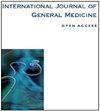成年人对脑静脉血栓的认识和看法:沙特阿拉伯全国横断面研究
IF 2.1
4区 医学
Q2 MEDICINE, GENERAL & INTERNAL
引用次数: 0
摘要
背景:目前,脑静脉血栓(CVT)的年发病率为每百万人中有 3-4 例。CVT 的临床表现程度各不相同,如果不及时治疗和处理,可能会造成严重或致命的后果。研究表明,公众对 CVT 的认识水平参差不齐。目的:评估沙特成年人口中不同社会经济阶层对 CVT 的认识水平和看法:方法:采用混合方法(电子问卷和电话访谈)收集数据,进行描述性横断面研究。向同意参加研究的人员分发了一份有效问卷,并由他们尽其所能填写。研究环境是在沙特阿拉伯进行的一项全国性调查,涉及研究人口中具有代表性的部分:本研究共纳入 1912 名参与者。总体而言,大多数研究参与者(67.2%)在评估时对 CVT 的了解程度较低,只有 2.6% 的人对 CVT 的了解程度较高。年龄较小、性别为女性、工作成年人、教育程度较高、婚姻状况、沙特籍和居住地与对 CTV 的了解程度有显著相关性(p < 0.001):本研究表明,研究人群对 CVT 的认知指数较低,这为大大改善公众对 CVT 的看法和认识提供了机会。可以利用我们的研究结果,通过最常用的信息获取方式,针对知识水平最低的人群进行宣传。本文章由计算机程序翻译,如有差异,请以英文原文为准。
Knowledge and Perceptions of Cerebral Venous Thrombosis Among the Adult Population: A Nationwide Cross-Sectional Study in Saudi Arabia
Background: The current annual incidence of cerebral venous thrombosis (CVT) is 3– 4 cases per one million population. CVT manifests itself with varying degrees of clinical presentation that may cause vital or morbid consequences if not treated and managed promptly. Studies have suggested varied levels of CVT public awareness.
Aim: To assess the level of knowledge and public perception of CVT across the different socio-economic strata of the Saudi Adult population.
Methods: A descriptive cross-sectional study was conducted using a mixed-method approach (an electronic questionnaire and phone interviews) for collecting the data. A validated questionnaire was distributed to consenting study participants and filled out to the best of their ability. The study setting was a nationwide survey conducted in Saudi Arabia and involved a representative portion of the study population.
Results: A total of 1912 participants were included in this study. Overall, the majority of study participants (67.2%) had a low knowledge level of CVT on assessment, and only 2.6% had a high knowledge level of CVT. Younger age, female gender, working adults, higher education level, marital status, Saudi nationals, and place of residency were significantly associated with knowledge of CTV (p < 0.001).
Conclusion: This study indicates a lower index of knowledge of CVT which offers an opportunity for much improvement in public perception and awareness of CVT in the study population. Our results can be utilized to target the demographics with the lowest knowledge via the most popular ways to gain information.
Aim: To assess the level of knowledge and public perception of CVT across the different socio-economic strata of the Saudi Adult population.
Methods: A descriptive cross-sectional study was conducted using a mixed-method approach (an electronic questionnaire and phone interviews) for collecting the data. A validated questionnaire was distributed to consenting study participants and filled out to the best of their ability. The study setting was a nationwide survey conducted in Saudi Arabia and involved a representative portion of the study population.
Results: A total of 1912 participants were included in this study. Overall, the majority of study participants (67.2%) had a low knowledge level of CVT on assessment, and only 2.6% had a high knowledge level of CVT. Younger age, female gender, working adults, higher education level, marital status, Saudi nationals, and place of residency were significantly associated with knowledge of CTV (p < 0.001).
Conclusion: This study indicates a lower index of knowledge of CVT which offers an opportunity for much improvement in public perception and awareness of CVT in the study population. Our results can be utilized to target the demographics with the lowest knowledge via the most popular ways to gain information.
求助全文
通过发布文献求助,成功后即可免费获取论文全文。
去求助
来源期刊

International Journal of General Medicine
Medicine-General Medicine
自引率
0.00%
发文量
1113
审稿时长
16 weeks
期刊介绍:
The International Journal of General Medicine is an international, peer-reviewed, open access journal that focuses on general and internal medicine, pathogenesis, epidemiology, diagnosis, monitoring and treatment protocols. The journal is characterized by the rapid reporting of reviews, original research and clinical studies across all disease areas.
A key focus of the journal is the elucidation of disease processes and management protocols resulting in improved outcomes for the patient. Patient perspectives such as satisfaction, quality of life, health literacy and communication and their role in developing new healthcare programs and optimizing clinical outcomes are major areas of interest for the journal.
As of 1st April 2019, the International Journal of General Medicine will no longer consider meta-analyses for publication.
 求助内容:
求助内容: 应助结果提醒方式:
应助结果提醒方式:


